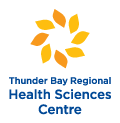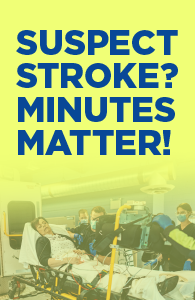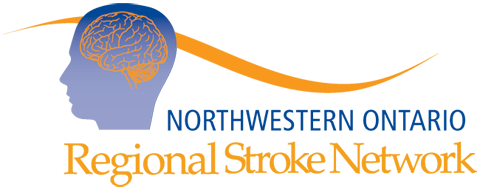React FAST: Stroke is a medical emergency and optimizing pre-hospital care improves patient outcomes.

Calling 9-1-1 is the best way for a person experiencing a stroke to receive the most efficient care. 77% of Canadians report that calling 9-1-1 is the first thing they would do if someone is having a stroke but according to research, this is not actually the case. In Canada, only 59% of people with stroke arrive at the hospital by ambulance. What this means is that 4 out of 10 Canadians experiencing a stroke are not calling 9-1-1. Coming to the hospital by ambulance is the safest and most beneficial way for a person to arrive and receive stroke care in a timely manner. Stroke is a medical emergency!
There are many reasons stated as to why a person does not call 9-1-1. These include thinking they could deal with the situation on their own, not actually realizing to call 9-1-1 when someone is experiencing a stroke, not wanting to cause a scene or just deciding to drive the person themselves. In Ontario the proportion of people who experienced a stroke that arrived to hospital by ambulance is only 69%. In Northwestern Ontario, only 49% of our population arrives at their local hospital by ambulance, much lower than the province as a whole.
Northwestern Ontario residents need to be aware of benefits of calling 9-1-1 and the expertise that paramedics bring to stroke care, especially during the critical first hours. Paramedics are trained to recognize the signs of stroke and mobilize the patient quickly. They start the time sensitive management of stroke care including monitoring vital signs and blood glucose. Paramedics also know which hospitals are best equipped to treat a stroke in our vast region. They speak to the person experiencing a stroke and/or family members to determine the time the person was last known to be well, any existing health conditions, current medications and allergies. A family member is also encouraged to accompany the stroke patient to the hospital if further information may be needed. The Paramedics pre-alert the hospital that a stroke patient is on their way, which is critical in activating the process of stroke care.
The Northwestern Ontario Regional Stroke Network recognizes that enhancing the education of the Emergency Medical System providers is vital to seamless stroke care. The Network has provided in-person training to not only the Paramedics in our region but has expanded the education to the First Responder Teams. Due to the large populated rural areas surrounding our cities and towns, there is a dedicated group of volunteers on call 24/7 known as First Responders Teams. First Response Teams can assist the suspected stroke patients with support as they prepare to hand off to the Paramedics as they proceed to timely life-saving services. The First Response Teams are a vital link between the suspected stroke patient and EMS.
We want to promote the important message that calling 9-1-1 for a suspected stroke helps to ensure the best possible outcome.
Reference: Heart and Stroke Foundation: Access to Stroke Care: The Critical First Hours, 2015 Stroke Report






